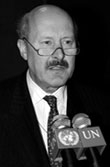- U.S. criticized for opposing international court
- Bush’s snub of criminal court undermines world justice
- The Crimes of War Project Online

UNITED NATIONS (FinalCall.com)–The United Nations Security Council, June 12, approved an exemption for U.S. peacekeepers from prosecution by the new International Criminal Court for another year.
Twelve “yes” votes were cast, with France, Germany and Syria abstaining. There are 15 members on the Security Council.
“The Americans knew clearly our position far in advance of today’s vote,” Germany’s UN ambassador, Gunter Pleuger, told The Final Call.
“For us, it was a matter of principle,” Amb. Pleuger said, adding that Germany would not stand by and see the ICC undermined. Germany had been in the forefront of organizing the court, based on the principles of the Nuremberg Nazi war crimes trials at the end of World War II.
Both Germany and France had argued before the vote that the Council should not automatically risk defying statutes that established the court. France voted in favor of exempting the United States in 2002. Germany was not a member at that time.
The German ambassador also said that his delegation was not ganging up on anyone. He was answering allegations from U.S. officials that opposition to the resolution would undermine efforts to bridge the trans-Atlantic divide. Observers said that most members of the Security Council were uncomfortable with the extension, including the United Kingdom and Spain, but they were keen not to reopen wounds caused by the debate over the Iraq war.
“In our view, it (ICC) is a fatally flawed institution,” U.S. representative James Cunningham told the Security Council. “The U.S. yields to no country in its historical leadership in the struggle for international justice,” he added.
But analysts said the United States was also leading in the exercise of “brute diplomacy.” “The U.S. administration is threatening to cut off tens of millions of dollars in aid to the countries of the Balkans, unless they reach bilateral agreements with the United States on the ICC by the end of the month,” charged Richard Dicker of Human Rights Watch. He said the Bush administration was waging a “jihad” against the ICC.
Washington is vehemently opposed to the permanent international court, arguing that soldiers, officials and citizens will be targeted for political reasons, an argument dismissed by the court’s supporters, who point out that safeguards have been built into the rules governing the court’s operation.
Under former President Bill Clinton, Washington signed the treaty establishing the court. But the United States did not ratify the treaty and Mr. Bush rescinded Mr. Clinton’s signature.
“What is it that the administration does not understand? Nothing will stop the court from going forward,” Mr. Dicker said.
But even UN Secretary-General Kofi Annan had strong words for extending Resolution 1422.
“I felt it was reasonable last year to adopt this resolution for 12 months, to give member states more time to study the Rome Statute–which was only then entering into force–and to digest its implications,” Mr. Annan said.
“But allow me to express the hope that this does not become an annual routine. If it did so, I fear the world would interpret it as meaning that this Council wished to claim absolute and permanent immunity for people serving in its operations, and that would undermine, not only the authority of the ICC, but also the authority of this Council and the legitimacy of UN peacekeeping,” Mr. Annan stressed.
South African ambassador Dumisani Kumalo told The Final Call that 90 nations had ratified the treaty, which attested to the widespread support the court enjoyed. And the number of pending ratifications clearly indicated the court’s universal acceptance, he said.
Syrian ambassador Mikhail Wehbe said there was no justification to renew resolution 1422 this year.
“Some 11 months have passed since the adoption of this resolution and no need has arisen during that time requiring the council to continue giving permanent immunity to one nation,” Ambassador Wehbe said.












